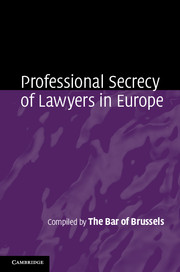Book contents
- Frontmatter
- Contents
- Contributors
- Preface
- 1 Professional secrecy in Europe
- 2 The CCBE rules on professional secrecy
- 3 Austria
- 4 Belgium
- 5 Bulgaria
- 6 Cyprus
- 7 Czech Republic
- 8 Denmark
- 9 Estonia
- 10 Finland
- 11 France
- 12 Germany
- 13 Greece
- 14 Hungary
- 15 Iceland
- 16 Ireland
- 17 Italy
- 18 Latvia
- 19 Liechtenstein
- 20 Lithuania
- 21 Luxembourg
- 22 Malta
- 23 The Netherlands
- 24 Norway
- 25 Poland
- 26 Portugal
- 27 Romania
- 28 Slovakia
- 29 Slovenia
- 30 Spain
- 31 Sweden
- 32 Switzerland
- 33 United Kingdom
- Index
- References
1 - Professional secrecy in Europe
Published online by Cambridge University Press: 05 June 2013
- Frontmatter
- Contents
- Contributors
- Preface
- 1 Professional secrecy in Europe
- 2 The CCBE rules on professional secrecy
- 3 Austria
- 4 Belgium
- 5 Bulgaria
- 6 Cyprus
- 7 Czech Republic
- 8 Denmark
- 9 Estonia
- 10 Finland
- 11 France
- 12 Germany
- 13 Greece
- 14 Hungary
- 15 Iceland
- 16 Ireland
- 17 Italy
- 18 Latvia
- 19 Liechtenstein
- 20 Lithuania
- 21 Luxembourg
- 22 Malta
- 23 The Netherlands
- 24 Norway
- 25 Poland
- 26 Portugal
- 27 Romania
- 28 Slovakia
- 29 Slovenia
- 30 Spain
- 31 Sweden
- 32 Switzerland
- 33 United Kingdom
- Index
- References
Summary
Concepts
A person seeking legal advice should be assured, when discussing his or her rights or obligations with a lawyer, that the latter will not disclose to third parties the information provided, and that this information will never be used against him or her. Only if this confidentiality is respected will people feel free to consult lawyers, to provide the information required for the lawyer to prepare the client's defence or ascertain the client's legal position, and to seek advice and legal assistance. Regardless of the type of information disclosed, the client must be certain that it will not be used against him or her in a court of law, by the authorities or any other party. It is generally considered to be a condition of the good functioning of the legal system, and thus in the general interest. Professional secrecy consequently protects both the information held by the lawyer and the correspondence and advice of the lawyer addressed to the client.
This confidentiality is more commonly referred to as professional secrecy or the attorney–client privilege, and is defined as the lawyer's obligation to maintain the confidentiality of information disclosed by a client in the context of the attorney–client relationship and the right of the client to consider any advice to him confidential. The lawyer is prohibited from disclosing the information, and the client is entitled to request that the information provided be kept confidential. The lawyer must in general refuse to disclose the information when requested to do so by a court, a public authority or any other third party. It also applies to the correspondence and advice of the lawyer to the client; this information is also protected by professional secrecy and benefits from the attorney–client privilege.
- Type
- Chapter
- Information
- Professional Secrecy of Lawyers in Europe , pp. 1 - 23Publisher: Cambridge University PressPrint publication year: 2013
References
- 4
- Cited by



